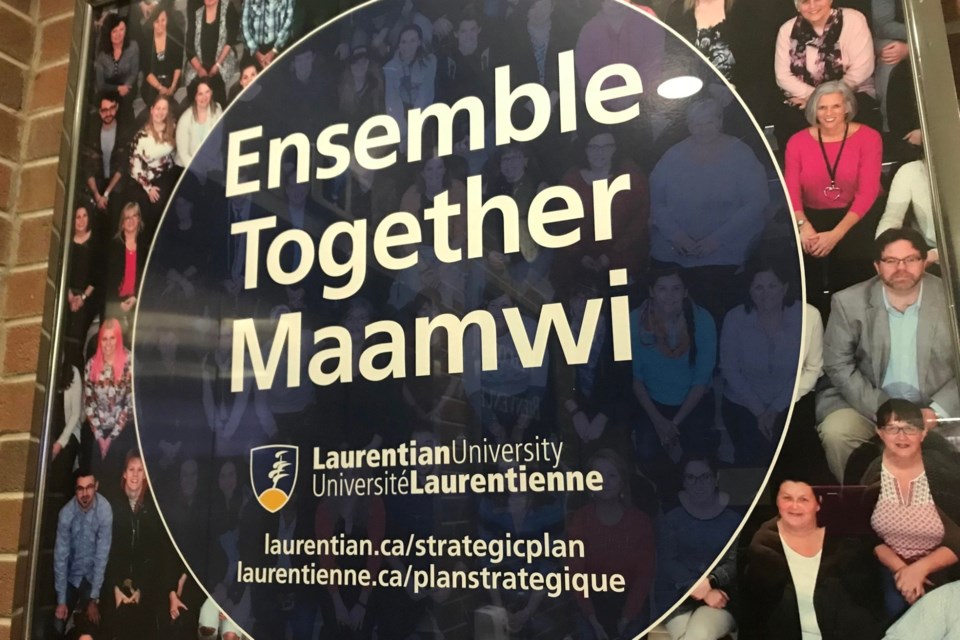SUDBURY - Guidance counsellors are telling students to avoid attending Laurentian University following its 22-month insolvency. Area school boards didn’t even return LU’s invitation to participate in consultations for its 2024-2029 strategic plan.
This according to a consultant hired by Laurentian to draft its strategic plan, who spoke Nov. 21 during a meeting of LU’s senate.
Chris Loreto of StrategyCorp responded during the meeting to senate members’ thoughts on the draft of the strategic plan, and they had a lot of them.
The draft strategic plan focuses on everything from faculty and student recruitment to alumni donations to extracurricular offerings to varsity sports.
Laurentian interim president Sheila Embleton said StrategyCorp is in the final stages of gathering feedback, and it’s expected the strategic plan will receive final approval from LU’s board of governors in February.
Looking at the draft of the strategic plan, a couple of senate members expressed concern about the strategic goal “to become the northern university of choice,” which speaks only of recruiting students from Northern Ontario as well as international students.
“I wonder if it’s a bit of a strategic mistake to emphasize the North quite so much,” said senate member Albrecht Schulte-Hostedde, who added that Laurentian also has to look at recruiting Canadian students from other areas of the country, including the GTA.
He said “at least in terms of the arguments made by the insolvency counsel,” one of the reasons for Laurentian’s insolvency is that “the demographics of the area are declining in terms of the numbers of potential students that might exist in the north that can attend Laurentian.”
Loreto said the draft plan’s focus on student recruitment in Northern Ontario is not exclusionary to recruitment in Southern Ontario.
“But we have heard that it seems like Laurentian became adrift in terms of its focus on the North in the backyard,” he said.
“The fact that the main school boards never responded to our opportunity to engage in consultation, the fact that we heard consistently about guidance counsellors advising students to avoid going to Laurentian, and maybe looking at institutions in the south, for us means strategically you have work to do in your own backyard.”
He said people in this part of the province are “scarred” not just from what has happened at Laurentian in the last few years, “but what has been perceived to have been drifting away from the community over the last decade, certainly.”
Another senate member, Anthony Church, said the counter-point to Loreto’s argument is “when you burn bridges in your own backyard, it's a lot easier to attract new customers, if you will, from outside of the market we previously served.”
Senate member Ramesh Subramanian said Laurentian is developing a five-year strategic plan and “it’s going to take a long time” to get its Northern Ontario domestic students back.
“The only thing I see that can sustain this is international students, at least in the next five years,” he said. “I'm just saying it's going to be a while you're going to rely on international students. So at some point, this has to be reflected in our strategic plan.”

A few senate members also took issue with the use of the word “tricultural” in the draft strategic plan, including in the proposed mission, which is: “Prepare the leaders of tomorrow through an inclusive, intellectually curious and connected bilingual and tricultural learning community.”
For years, Laurentian has been known as a bilingual (French and English) as well as a tricultural (French, English and Indigenous) institution.
But senate member Markus Timusk said he’s always been a bit confused by the term tricultural, and doesn’t find it inclusive.
“We have a very strong drive to recruit international students to our university, and so are they part of the learning community?” he said. “Are they included in the tricultural learning community if they're coming from countries that are not part of these three cultures?”
Dominic Beaudry, Laurentian’s associate vice-president, academic and Indigenous programs, said the term tricultural helps Indigenous communities feel included at Laurentian.
As for international students, he said they come here and want authentic experiences of Indigenous communities.
“There's an international population here and they're coming to Indigenous communities to learn about authentic Indigenous ceremony and authentic language, authentic culture,” he said.
Senate member Ernst Gerhardt said one of the draft strategic plan’s strengths is there is no “radical change” from the university’s last strategic plan.
He said while the plan’s mission talks of an “intellectually curious” learning community (though fellow senate member Schulte-Hostedde pointed out this should apply to all universities), there’s no mention of this concept under the academic planning part of the document.
Instead the document lapses into “corporate speak” or “CCAA speak” (referring to the language used by insolvency lawyers during LU’s time operating under creditor protection), he said.
“So instead of talking about offering courses for curious students, it talks about providing in-demand programs that are sustainable,” Gerhardt said. “I think that’s a contradiction. We all understand what's being said there. But I think that if one of the values is intellectual curiosity, we should be pursuing that throughout the plan, and not limiting our language to in-demand or sustainable or what have you.”
Senate member Shannon Bassett asked how the aspirational visions of the strategic plan would be translated into reality, and if Key Performance Indicators (KPIs) would be attached.
“So once the direction is set through this document, we'll be turning our attention to develop an implementation plan,” Loreto said.
“The implementation plan for this will have some things where it can be pretty clear cut and associated with each goal, and part of the Implementation Plan will be key performance indicators.”
Laurentian continues to gather feedback as it finalizes its strategic plan. A town hall meeting as well as a drop-in engagement session were to be held on-campus Nov. 23.
Another drop-in engagement session takes place today (Nov. 24) from 9 a.m. to noon in the atrium of the Parker Building.
You can also email [email protected] to give your input.
Heidi Ulrichsen is Sudbury.com’s assistant editor. She also covers education and the arts scene.
